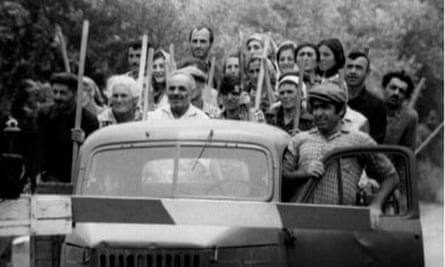On the time when the movie Favourites of the Moon was launched in France in 1985, little was recognized in western Europe about its Georgian director, Otar Iosseliani, who has died aged 89. He had already made three options and several other shorts within the Soviet Union, the place he had suffered some censorship, the prime purpose for his changing into an exile in France in 1982. For a lot of, Favourites of the Moon, shot in Paris in French, was their first entry into the singular world of Iosseliani.
His self-described “summary comedies” are understated and incisive explorations of human absurdity, at all times devoted to his idiosyncratic imaginative and prescient, and discarding any type of cohesive narrative. Iosseliani noticed his characters via behaviour fairly than dialogue. His use of sound and silence, and his advanced actions of individuals, animals and objects made him the true inheritor to Jean Renoir, Jacques Tati and Luis Buñuel.
Born within the Georgian capital, Tbilisi (then known as Tiflis), Iosseliani studied composing, conducting and piano on the Tbilisi Conservatory, after which took a level in arithmetic at Moscow College. Nonetheless, he grew to become drawn to the cinema, and graduated from the All-Union State Institute of Cinematography (VGIK, now often called the Gerasimov Institute of Cinematography) within the metropolis, the place he had attended lessons given by the movie director Alexander Dovzhenko.
As a scholar, he started working on the Gruzia movie studios in Tbilisi, first as an assistant director after which as an editor of documentaries.

When Iosseliani began his profession as a director in 1958, there was relative freedom of expression within the Soviet Union due to the Nikita Khrushchev thaw. This continued into the mid-Nineteen Sixties, when repression set in once more.
Nonetheless, Iosseliani’s 46-minute movie April (1961) was banned from launch due to “extreme formalism”; it was ultimately screened on the 2000 Cannes movie competition. The lyrical, barely surreal love story follows a younger couple who, imagining themselves in a brand new flat, switch their love for each other on to their possessions.
With inventive use of sound and little dialogue, the movie already carried the unique stamp of an auteur. “All the things that occurs in my movies has to do with folks’s weak point for possession,” Iosseliani stated. “And this results in actual values akin to emotions disappearing.”
After 5 years, throughout which period he was a sailor on a fishing boat and labored at a metallurgical manufacturing facility, Iosseliani made his first full-length function, Falling Leaves (1966), which confirmed the attribute parts of his type in making an attempt “to seize moments of passing life”. The movie is about in a wine manufacturing facility and reveals an trustworthy younger man dwelling in a bureaucratic universe of Soviet corruption. As an indication of his non-conformity, he doesn’t have a moustache, the Georgian image of bourgeois respectability and manhood.

As soon as Upon a Time There Was a Singing Blackbird (1970) – mischievously bearing a inventory Georgian fairytale title – portrays the lifetime of a happy-go-lucky musician within the Tbilisi orchestra.
As a result of Pastorale (1975) was not thought-about “edifying sufficient” by the Soviet authorities, it was screened within the west solely in 1982 (on the Berlin and London movie festivals), the yr that Iosseliani determined to settle in Paris. It involved the members of a string quartet, on a summer time vacation within the Georgian countryside, who’re witness to the squabbles of small-minded peasants. As anti-authoritarian as all Iosseliani’s movies, Pastorale paints a wry and poetic portrait of cultural disconnection.
Favourites of the Moon, his first French-language movie, adopted the separate paths of dozens of Parisian thieves, which consistently criss-cross as cash, work and objets d’artwork change arms. For a short time the movie appears to be a sequence of incoherent incidents regarding inexplicable characters (a sample that was to be set for his subsequent work). However step by step the kaleidoscopic methodology yields a pointy satire on the greed and vacancy of bourgeois society.

The close to wordless Chasing Butterflies (1992) unfolds in a sequence of chic lengthy pictures with the bodily precision and absurdity that remembers the movies of Tati. This parable, set in up to date France, revolves across the aristocratic lives of two aged ladies who dwell in an opulent although dilapidated chateau. Exterior their charmingly dusty world of outdated letters, artwork and contentment, the jaws of commerce, thieves and covetous heirs await their deaths.
Brigands Chapter VII (1996), which received a particular jury prize on the Venice movie competition, strikes barely away from the farce of Tati in the direction of the black humour of Buñuel. The movie shifts deftly between the center ages, Soviet Russia and modern-day Paris – the principle characters being a despotic tyrant, a Stalinist apparatchik and a homeless man.
A number of the movie was shot in Georgia, marking Iosseliani’s return to his homeland after 14 years. “All my movies are Georgian movies,” he claimed. “Though most of my movies are set in provincial France, there may be at all times a Georgian village behind the facades; and this village is also a village anyplace else on this planet.”
Farewell, House Candy House (1999) presents members of a rich Parisian household who lead absurd double lives in secret. There are not any punchlines, no dramatic outbursts, only a daisy chain of occasions that poke enjoyable on the fickleness of human nature.
In Monday Morning (2002), which received the Silver Bear in Berlin, Iosseliani narrowed his focus barely by concentrating on one character, a middle-aged manufacturing facility employee, who decides to interrupt free from his soulless nine-to-five life by spending a couple of days in Venice. This comedy revealed the director’s capability to search out pleasure within the trivialities of quotidian existence.
In one other delicate fable of self-liberation, Gardens in Autumn (2006), the unlikely hero is a sad-eyed, middle-aged cupboard minister. His life modifications when he’s discharged, and he leaves his vacuous lover and overbearing mom (Michel Piccoli in drag), to guide a carefree bohemian existence.
The topic of Chantrapas (2010) – the title being a variation on the French expression Chantre Pas (Can’t Sing) – was nearer to Iosseliani’s personal life than his different motion pictures, being a few Georgian film-maker combating to retain his inventive freedom in each the Soviet Union and France.
Nonetheless, Iosseliani, who made a number of droll appearances in his movies, denied any autobiographical intent. “I by no means recount what I’ve noticed within the lives of myself or my comrades, associates and neighbours. I merely invent parables and attempt to make them as near actual life as I have to, so that individuals will imagine in these parables.”
His final function movie, Winter Music, peopled by the inhabitants of a Parisian house constructing every in their very own vogue resisting the way in which of the world, was launched in 2015.
Otar Iosseliani, movie director, born 2 February 1934; died 17 December 2023













